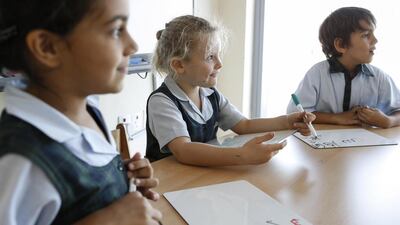DUBAI // Private schools in Dubai must urgently address their shortcomings in teaching Arabic, the education regulator has said in a report.
The warning was issued on Monday in the Knowledge and Human Development Authority's report, Key Findings: 2013-2014 Inspection of Private Schools.
The report outlines the strengths and weaknesses of the 141 private schools inspected and offers recommendations for improvements.
"Almost three quarters of schools had shortcomings in Arabic as a first and additional language," the report said. "In some, there was a slight improvement in speaking and listening, but little improvement in reading and writing.
“Approaches to teaching and learning Arabic were too often repetitive and did not motivate or engage students.”
The report found there had been no overall improvement in attainment or progress in Arabic as a first language, and evidence of decline, particularly in the primary phase.
There had also been little improvement among pupils learning Arabic as an additional language.
And almost all of the schools rated “outstanding” still had an area of Arabic where significant improvement was required, the report found.
“Some schools will be able to build on the good work started in improving speaking and listening, but all will need to develop students’ skills in reading and writing,” the authority said in its key recommendation on Arabic.
“Schools should broaden approaches to teaching and learning in Arabic so that students feel more enthusiastic, confident and competent, in speaking, reading and writing the language.”
Ayesha Al Janahi, 31, mother of a KG1 pupil at a Dubai private school, praised the authority for highlighting the issue.
“The UAE identity should be instilled in children but I realise some schools don’t even play the national anthem,” Mrs Al Janahi said. “If you want to instil something in children it should be in the early years.”
She said she had begun singing the words of the national anthem to her four-year-old son before taking him to school so he could memorise it.
“The other thing is Islamic. They don’t have qualified teachers for teaching Islamic,” Mrs Al Janahi said. “They should memorise the verses. They should know the Holy Quran.
“They don’t do anything like this. The thing that they are lacking is Islamic.
“You can see now most of the Emiratis and the Arabs, they don’t have fluent Arabic. They are speaking as if they are just learning, like an expat mostly, not like their mother tongue is Arabic. This should be the biggest focus.”
About 29,000 Emiratis attend private schools in Dubai. Most of them – 16,260 – are enrolled in schools rated as "acceptable".
There were 237,735 students enrolled in private schools in Dubai this academic year, compared with 221,332 last year.
The authority also stressed the need for private schools to work towards meeting international assessment benchmarks outlined this year by Sheikh Mohammed bin Rashid, Vice President and Ruler of Dubai, as part of his National Agenda.
The targets call for the UAE to be among the 15 highest performing countries in Trends in International Mathematics and Science Study tests, and in the top 20 countries in Programme for International Student Assessment exams.
So far only the International Baccalaureate and UK curriculum schools meet the National Agenda targets, the latest test results show.
rpennington@thenational.ae

